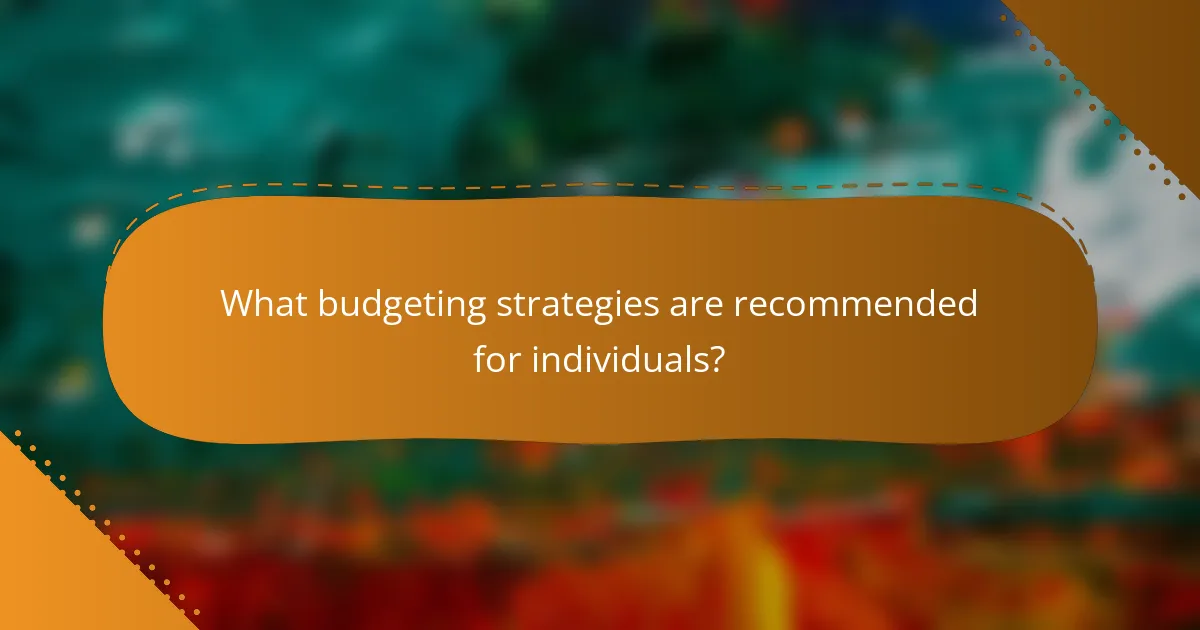As fall approaches, it’s essential to focus on effective financial planning strategies that can enhance your budgeting skills and resource management. Engaging with local financial advisors and utilizing online tools can provide valuable insights, especially when resources are limited. By prioritizing essential needs and adopting structured budgeting methods, you can ensure financial stability and work towards your financial goals this season.

What are effective financial planning tips for fall workshops?
Effective financial planning tips for fall workshops include utilizing available resources, engaging with local financial advisors, and leveraging online budgeting tools. These strategies can help individuals and organizations maximize their financial literacy and manage their budgets more effectively during this season.
Utilizing community resources
Community resources can provide valuable support for financial planning. Many local organizations offer free workshops, seminars, or counseling sessions focused on budgeting and financial management. Check with community centers, libraries, or non-profits in your area for upcoming events.
Additionally, local government programs may provide assistance or grants for financial education. Participating in these resources can enhance your understanding of financial concepts and help you make informed decisions.
Engaging local financial advisors
Local financial advisors can offer personalized guidance tailored to your specific financial situation. By consulting with an advisor, you can gain insights into budgeting strategies, investment options, and retirement planning. Look for advisors with good reputations and relevant certifications.
Consider scheduling a free initial consultation to discuss your goals and assess whether their services align with your needs. Be cautious of high fees; ensure that the advisor’s compensation structure is transparent and reasonable.
Leveraging online budgeting tools
Online budgeting tools can simplify financial planning by providing easy-to-use platforms for tracking expenses and managing budgets. Many apps allow you to set financial goals, categorize spending, and generate reports on your financial health. Popular options include Mint, YNAB (You Need A Budget), and PocketGuard.
When choosing a tool, consider factors such as user interface, cost, and features that align with your budgeting needs. Many tools offer free versions, making it easy to start without financial commitment. Regularly updating your budget in these tools can help you stay on track and adjust your spending habits as needed.

How can limited resources affect financial planning?
Limited resources can significantly impact financial planning by restricting options for saving, investing, and managing expenses. When funds are tight, prioritizing essential needs becomes crucial to ensure financial stability and avoid unnecessary debt.
Prioritizing essential expenses
When resources are limited, identifying and prioritizing essential expenses is vital. Start by categorizing your spending into needs and wants; needs include housing, food, transportation, and healthcare, while wants encompass discretionary items like dining out and entertainment.
Consider creating a budget that allocates a specific percentage of your income to each essential category. For instance, aim to spend no more than 50% of your income on necessities, allowing the remaining funds for savings and discretionary spending. Regularly review and adjust your budget to reflect changing circumstances.
Exploring low-cost financial education options
Accessing financial education doesn’t have to be expensive. Many community organizations, libraries, and online platforms offer free or low-cost workshops and resources on budgeting, saving, and investing. Look for local nonprofit organizations that provide financial literacy programs tailored to your needs.
Additionally, consider utilizing online resources such as webinars, podcasts, and articles from reputable financial websites. These can provide valuable insights without the cost of formal classes. Always verify the credibility of the sources to ensure you’re receiving accurate and practical information.

What budgeting strategies are recommended for individuals?
Individuals can benefit from various budgeting strategies that help manage their finances effectively. These methods provide frameworks for tracking income and expenses, ensuring that spending aligns with financial goals.
Zero-based budgeting method
The zero-based budgeting method requires individuals to allocate every dollar of their income to specific expenses, savings, or debt repayment, resulting in a net balance of zero at the end of the month. This approach encourages careful tracking of all expenditures and prioritizes essential spending.
To implement zero-based budgeting, start by listing all sources of income and then categorize every expense, including fixed costs like rent and variable costs like groceries. Adjust your budget as necessary to ensure that all income is accounted for, and consider using budgeting tools or apps to simplify the process.
50/30/20 rule for budgeting
The 50/30/20 rule is a straightforward budgeting strategy that divides after-tax income into three categories: 50% for needs, 30% for wants, and 20% for savings and debt repayment. This method offers a balanced approach to managing finances while allowing for flexibility in spending.
To apply the 50/30/20 rule, calculate your monthly take-home pay and allocate the appropriate percentages to each category. For example, if your monthly income is $3,000, you would allocate $1,500 for needs, $900 for wants, and $600 for savings or debt repayment. Regularly review and adjust these allocations to reflect changes in income or expenses.

What are the best tools for budgeting in 2023?
The best tools for budgeting in 2023 include user-friendly apps that help individuals track expenses and manage their finances effectively. Popular options like Mint and YNAB (You Need A Budget) cater to different budgeting styles and needs, making it easier to stay on top of financial goals.
Mint for expense tracking
Mint is a widely-used budgeting tool that allows users to track their expenses by linking bank accounts and credit cards. It automatically categorizes transactions, providing a clear overview of spending habits and helping identify areas for improvement.
To get started with Mint, simply create an account and connect your financial accounts. The app will generate a personalized budget based on your spending patterns. Users should regularly review their categories to ensure accuracy and make adjustments as needed.
YNAB for proactive budgeting
YNAB focuses on proactive budgeting by encouraging users to allocate every dollar they earn to specific expenses or savings goals. This method helps individuals prioritize their spending and avoid overspending in any category.
To effectively use YNAB, start by setting up your budget categories and entering your income. The app emphasizes the importance of adjusting your budget as expenses arise, promoting a hands-on approach to financial management. Users should be aware that YNAB operates on a subscription model, which may be a consideration for those with limited resources.

How can workshops enhance financial literacy?
Workshops can significantly boost financial literacy by providing hands-on learning experiences and direct access to financial concepts. Participants engage with practical tools and strategies that can be applied to their personal finances, making complex topics more accessible.
Interactive learning experiences
Interactive workshops allow participants to engage directly with financial topics through activities like budgeting simulations and case studies. This hands-on approach helps solidify understanding by applying theories in real-life scenarios.
For example, a budgeting workshop might include exercises where attendees create a budget based on hypothetical income and expenses. This practice can reveal common pitfalls and encourage better financial decision-making.
Networking opportunities with experts
Workshops often feature financial professionals who share their expertise and insights, providing participants with valuable networking opportunities. Engaging with these experts can lead to personalized advice and mentorship.
Attendees can ask questions and gain clarity on specific financial issues, such as investment strategies or debt management. Building relationships with professionals can also open doors to future resources and support in financial planning.

What criteria should be considered when selecting a financial workshop?
When selecting a financial workshop, consider the instructor’s qualifications and the relevance of the workshop content to your financial goals. These factors can significantly impact the quality of information you receive and how applicable it is to your personal situation.
Instructor qualifications
The instructor’s qualifications are crucial for ensuring that you receive accurate and reliable financial advice. Look for instructors with relevant certifications, such as Certified Financial Planner (CFP) or Chartered Financial Analyst (CFA), as these credentials indicate a strong foundation in financial principles.
Additionally, consider the instructor’s experience in the field. An instructor with years of practical experience can provide insights that are not found in textbooks. Check for reviews or testimonials from past participants to gauge their effectiveness and teaching style.
Workshop content relevance
The relevance of the workshop content to your specific financial needs is essential. Review the syllabus or agenda to ensure it covers topics that align with your goals, such as budgeting, retirement planning, or investment strategies. Workshops that focus on current market trends or local economic conditions can offer more applicable insights.
Also, consider the format of the workshop. Interactive sessions that allow for questions and discussions often lead to a better understanding of complex topics. Look for workshops that provide practical tools or resources, such as budgeting templates or investment calculators, to help you implement what you learn.

How can technology improve financial planning?
Technology enhances financial planning by providing tools that streamline budgeting, tracking expenses, and analyzing financial data. With various apps and software, individuals can access real-time insights, making informed decisions about their finances.
Mobile apps for real-time tracking
Mobile apps are essential for real-time tracking of expenses and income, allowing users to monitor their financial health on the go. Popular apps like Mint, YNAB (You Need A Budget), and PocketGuard help categorize spending and set budgets, making it easier to stick to financial goals.
When choosing an app, consider features such as bank synchronization, user interface, and reporting capabilities. Many apps offer free versions with basic features, while premium options may provide advanced analytics and personalized advice.
To maximize the benefits of these apps, regularly update your transactions and review your financial status weekly. This habit can help identify spending patterns and areas for improvement, ensuring you stay on track with your financial objectives.


